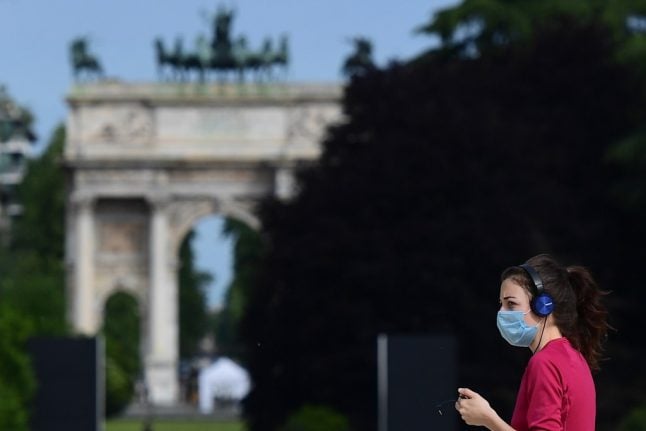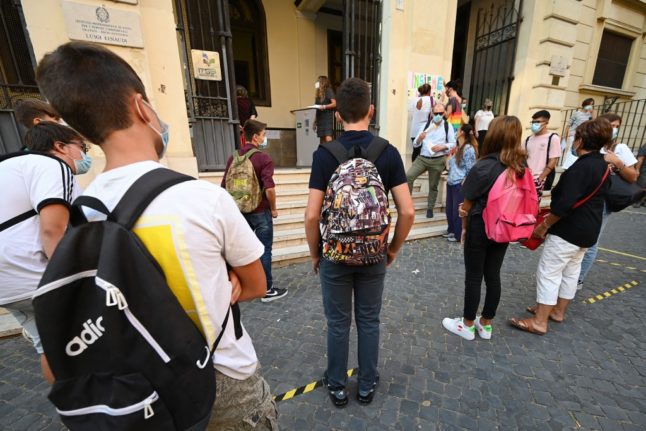More than four million people — an estimated 72 percent of them men — returned to their construction sites and factories as the economically and emotionally shattered country tried to get back to work.
The sounds of banging and drilling echoed across Rome and a group of men drank espresso out of plastic cups in front of the Pantheon, the former Roman temple, as cafes reopened for takeout service.
READ ALSO: Phase Two: What changes in Italy from May 4th?
“We can hear more noise now,” Rome grocery story owner Daniela observed. “It's better than this frightening silence.”
But bars and even ice cream parlours remain shut. The use of public transport will be discouraged and everyone will have to wear masks in indoor public spaces.
“We are feeling a mix of joy and fear,” said 40-year-old Stefano Milano in Rome.
“There will be great happiness in being able to go running again carefree, in my son being allowed to have his little cousin over to blow out his birthday candles, to see our parents,” the father-of-three said.
“But we are also apprehensive because they are old and my father-in-law has cancer so is high risk.”
READ ALSO:
- CALENDAR: What will Italy reopen first under new lockdown rules?
- Q&A: Italy's new rules on going outside in lockdown phase two
- Will we still need a form to go outside under Italy's lockdown phase two?
Italy became the first Western democracy to shut down virtually everything in the face of an illness that has now officially killed 28,884 — the most in Europe — and some fear thousands more.
The lives of Italians began closing in around them as it became increasingly apparent that the first batch of infections in provinces around Milan were spiralling out of control.
Prime Minister Giuseppe Conte began by putting a quarter of the population in the northern industrial heartland on lockdown on March 8th.

Disinfecting Piazza Duomo in Milan. Photo: Piero Cruciatti/AFP
The sudden measure frightened many — fearful of being locked in together with the gathering threat — into fleeing to less affected regions further south. The danger of the virus spreading with them and incapacitating the south's less developed health care system forced Conte to announce a nationwide lockdown on March 9th.
“Today is our moment of responsibility,” Conte told the nation. “We cannot let our guard down.”
The official death toll was then 724. More waves of restrictions followed as hundreds began dying each day. Almost everything except for pharmacies and grocery stores was shuttered across the Mediterranean country of 60 million on March 12th.
Conte's final roll of the dice involved closing all non-essential factories on March 22nd. Italy's highest single daily toll — 969 — was reported five days later.
LATEST: Italy's coronavirus deaths fall to lowest since lockdown began
The economic toll of all those shutdowns has been historic. Italy's economy — the eurozone's third-largest last year — is expected to shrink more than in any year since the global depression of the 1930s.
Half of the workforce is receiving state support and the same number told a top pollster that they were afraid of becoming unemployed.
And some of those who are out of a job already say they do not entirely trust in Conte's ability to safely navigate the nation out of peril.
“I am worried about the reopening. The authorities seem very undecided about how to proceed,” 37-year-old Davide Napoleoni told AFP.
READ ALSO: Here's how to apply for Italy's 600-euro emergency bonus payment
Conte's popularity has jumped along with that of most of other world leaders grappling with the pandemic thanks to a rally around the flag effect.
But a Demos poll conducted at the end of April found some of Conte's lustre fading. Confidence in his government has slipped by 8 percentage points to a still-strong 63 percent since March.
Italy's staggered reopening is complicated by a highly decentralised system that allows the country's 20 regions to layer on their own rules.
Venice's Veneto and the southern Calabria region have thus been serving food and drink at bars and restaurants with outdoor seating since last week.

A closed beach cafe in Ostia, near Rome. Photo: Vincenzo Pinto/AFP
The Liguria region around Genoa is thinking of allowing small groups of people to go sailing and reopening its beaches. Neighbouring Emilia-Romagna is keeping them closed — even to those who live by the sea.
All this uncertainty appears to be weighing on the nation's psyche. A poll by the Piepoli Institute showed 62 percent of Italians think they will need psychological support with coming to grips with the post-lockdown world.
“The night of the virus continues,” sociologist Ilvo Diamanti wrote in La Repubblica daily.
“And you can hardly see the light on the horizon. If anything, we're getting used to moving in the dark.”



 Please whitelist us to continue reading.
Please whitelist us to continue reading.
Those who criticize or question Conte should walk in his shoes for a few days. He has done an amazing job – measured, thoughtful, thorough. I am grateful he is in charge!
I agree. I still miss Berlinguer, but this pandemic has forced me to see the benefits of government by non- political technocrats. Never mind that the poor man didn’t want the job in the first place. Just imagine what would have happened if there had been snap elections and the fascist had won.